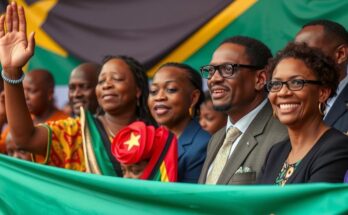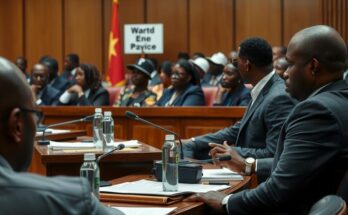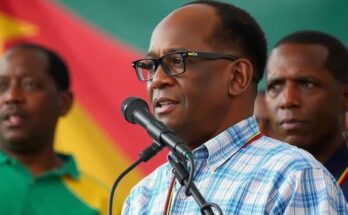Namibia’s SWAPO party, ruling since 1990, faces increasing challenges in the upcoming elections after losing its two-thirds majority in 2019. With a fragmented opposition and significant issues like unemployment at stake, the elections could redefine the political landscape. Meanwhile, Netumbo Nandi-Ndaitwah aims to become the first female president amid these shifts.
Tunisia is currently witnessing a pivotal electoral battle as the South West Africa People’s Organisation (SWAPO) faces significant challenges ahead of the presidential and parliamentary elections. Having maintained power since Namibia’s independence in 1990, SWAPO’s dominance has weakened in recent years, marked by the loss of its two-thirds majority in the 2019 elections. The political landscape is fragmented, with over twenty parties contesting, yet analysts argue that SWAPO’s strength is amplified by the disorganized opposition.
In the face of economic challenges and rising unemployment, political veteran Netumbo Nandi-Ndaitwah, serving as the current vice president, aims to become Namibia’s first female president. She has ambitious plans to address youth unemployment with a projected investment of 85 billion Namibian dollars over five years, although these promises have raised skepticism among critics. No matter the outcome, the elections will serve as a litmus test for SWAPO’s resilience amidst a more competitive political environment.
The Independent Patriots for Change (IPC), led by Panduleni Itula, poses a serious challenge to SWAPO’s hegemony as it seeks to gain ground following a strong performance in 2019. Characterized by internal divisions, the opposition’s lack of unity may, however, hinder their effectiveness against SWAPO’s established power.
Political analysts suggest that SWAPO may find it advantageous to navigate a divided opposition while maintaining control through electoral mechanisms that favor even minor parties. Notable shifts in voter sentiment and the election dynamics will make these upcoming votes crucial in determining whether SWAPO can retain a significant portion of its support or face a notable reduction in its parliamentary presence.
The decline of support for long-standing ruling parties across southern Africa has manifested prominently in Namibia, where SWAPO has faced considerable challenges following its historical dominance since independence. After losing its two-thirds majority in the 2019 elections and legislative control in urban centers in 2020, SWAPO’s evolving public perception reflects broader regional trends. Political fragmentation and the lack of cohesion among opposition parties contribute to SWAPO’s endurance, presenting a complex electoral landscape as the nation prepares for what could be a transformative election.
As Namibia approaches its electoral date, the political arena is rife with uncertainty. With SWAPO encountering new hurdles and the opposition, notably the IPC and Affirmative Repositioning, gaining traction, the elections are poised to reshape the political landscape. Netumbo Nandi-Ndaitwah’s candidacy introduces the possibility of historical milestones, particularly in addressing critical economic issues. However, prevailing internal divisions within the opposition may still allow SWAPO to uphold a notable degree of influence, marking the 2024 elections as a moment of potential change or continuity for Namibian governance.
Original Source: www.dw.com




